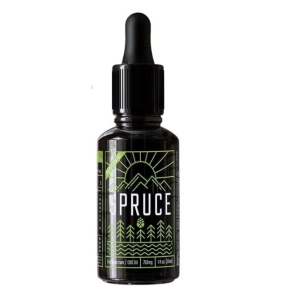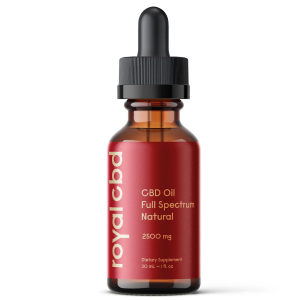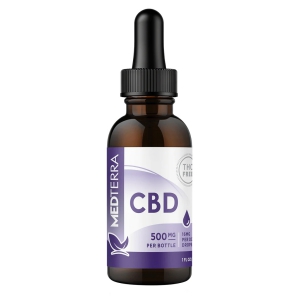 Expert's opinion
Expert's opinion
The article is a subjective view on this topic written by writers specializing in medical writing.
It may reflect on a personal journey surrounding struggles with an illness or medical condition, involve product comparisons, diet considerations, or other health-related opinions.
Although the view is entirely that of the writer, it is based on academic experiences and scientific research they have conducted; it is fact-checked by a team of degreed medical experts, and validated by sources attached to the article.
The numbers in parenthesis (1,2,3) will take you to clickable links to related scientific papers.
Best CBD For Tourettes 2024: Does Medical Marijuana Help?
All articles are produced independently. When you click our links for purchasing products, we earn an affiliate commission. Learn more about how we earn revenue by reading our advertise disclaimer.

Spruce CBD
15% Off Coupon: HEALTHCANAL

Royal CBD
20% Off Coupon: HC20

Medterra
15% Off Coupon: HEALTHCANAL
The search for alternative solutions in treating many serious neurological tic disorders nowadays has led to some incredible findings. Using medical marijuana and/or CBD for treating Tourette’s syndrome is one of them, as the question of their efficacy comes into play.
Top 3 Best CBD For Tourettes On the Market
Some of the best CBD oils on the market currently include:
- Spruce CBD – Best full-spectrum
- Royal CBD – Best overall
- Medterra – Best transparency
Does CBD Help With Tourette’s Symptoms?
Cannabinoids have been researched as potential alternative treatments in relieving symptoms of Tourette’s syndrome since 1989[1], with the growing interest in CBD in recent years.
CBD has shown therapeutic properties[2] in lowering inflammation and pain, reducing convulsions, helping treat nausea and sickness, as well as protecting the nerves.
In June 2018, the FDA approved one CBD-based medicine for the treatment of two rare forms of epilepsy. This was the first federally sanctioned medical use for CBD in the United States. That led to further research in CBD-supported treatments in other neurological and neuropsychiatric disorders.
The Tourette Association of America formed a Cannabis Consortium composed of leading experts, clinicians, and researchers in the field, whose job was to evaluate and analyze existing research. Unfortunately, due to a lack of randomized, large-scale trials and data, they reported that the existing scientific evidence is insufficient to conclude the safety and efficacy of broad-spectrum CBD oil and medical marijuana for the treatment of Tourette’s syndrome.
How Can Marijuana Help With Tourette’s Syndrome?
The difference between pure CBD oil and medical marijuana is in its content. While CBD exists in its pure form, medical marijuana contains two different chemical components, THC and CBD.
Even though the research[3] is insufficient and has only been done on a smaller scale, there are those who report reduced tics as well as a relief in mental disorders that often accompany the condition when using. Still, the same that’s been said for Tourette’s syndrome CBD product can be repeated here, the research and data are insufficient to conclude how medical marijuana actually helps with Tourette’s syndrome and its symptoms.
Medical Marijuana 101
Although still illegal at the federal level, marijuana has been legalized (or decriminalized) for medical use in 36 states and four territories. Due to this report, issued by the Institute of Medicine, which states how scientific data indicate the potential therapeutic value of THC and other cannabinoids, many of the US states decided to decriminalize its use for medical purposes.
At the federal level, marijuana remains classified as a Schedule I substance, which means that it’s considered to have a high potential for abuse and no accepted medical use, making its distribution a federal offense. The state vs. federal perspective remains different and when colliding, each situation comes out with an individual outcome depending on the case.
The biggest challenges regarding medical marijuana include how to regulate its recommendation, dispensing, and registration of approved patients. Some states have created specific programs for registering and tracking their patients, while others are still trying to figure out what works for them best.
Still, the therapeutic potential of medical marijuana exists, and it’s recommended in many cases in patients dealing with chronic pain[4], PTSD[5], late-stage cancers, and chemotherapy-induced vomiting and nausea[6].
Probably the most common use for medical marijuana in the United States is for pain control, specifically chronic pain. It’s safer than opiates (such as oxycodone or Vicodin) and it can take the place of NSAIDs (non-steroidal anti-inflammatory drugs) for those who can’t take them due to problems with their kidneys or ulcers, as well as GERD.
It appears that medical marijuana eases neuropathic pain[7], an area that is hard to find treatment for in general. One of the reasons for this is its muscle-relaxing characteristic which is why it’s generally recommended to people with Parkinson’s disease[8] (to calm down tremors), fibromyalgia, endometriosis, interstitial cystitis, and most other conditions where the final common pathway is chronic pain.
Another important use of medical marijuana is in helping alleviate and manage nausea and weight loss, and it can also be used to treat glaucoma[9]. It’s known to open up the appetite, so those having food issues can get hungrier and help prevent unwanted weight loss.
The Recreational Use Of Marijuana
The recreational use of marijuana differs from its medical characteristics due to the fact the person taking it doesn’t have to have a medical condition to be a user. The laws in the US are changing daily, with all 50 countries being in the loop.
At the moment, 18 states, two territories, and Washington DC have legalized small amounts of marijuana for adult recreational use. Others are bound to follow suit.
Risk & Side Effects
Being classified as a Schedule I substance, medical marijuana comes with some risks and side effects that don’t have to present themselves in everyone. These include:
- Changes in sleep and appetite
- Overall fatigue
- Problems with memory and mood
- Slowed-down reaction time
- Potential paranoia
The Marijuana Risks
Getting high from marijuana is a natural concern for everyone who’s never tried using it, as well as what damage it could do to one’s lungs and brain. The FDA hasn’t approved marijuana as a medicine, and the CDC] doesn’t consider it to be one as well.
Since it’s being inhaled, the potential of damaging the lungs and cardiovascular system exists, as well as the still-unknown long-term effects it may have on your brain. Another problem with medical marijuana stems from the fact that the ingredients in each plant can be different, causing uncertainty in what kind and how much of a chemical you’re actually getting.
The same uncertainty exists in whether or not medical marijuana will get you high[10], as well as potentially make you addicted. The problem comes from the fact that in the last 20 years, there’s been a 212% increase in THC content in the marijuana flower, making even the small doses stronger and more potent than ever before.
The increased potency of THC showed visible withdrawal symptoms[11] which include anger, irritability, depression, restlessness, headache, loss of appetite, insomnia, and severe cravings for marijuana.
It seems that 9% of those who experiment with marijuana[12] will eventually become addicted, with 25–50% of those being daily users. A study conducted in the UK in 2015[13] found that marijuana use is associated with “increased severity of dependence, especially in young people.”
Tourette’s Syndrome
Tourette’s syndrome is a serious nervous system disorder that causes sudden, repetitive movements, twitches, and sounds. People who suffer from Tourette’s cannot control these tics, and since they’re sudden, they can happen anytime, anywhere.
Types Of Tics
All tics can be divided into two groups: motor and vocal.
- Motor tics are movements of the body, such as blinking, jerking parts of the body, shaking, shrugging the shoulders, facial grimacing, and similar.
- Vocal tics include yelling out a word or a phrase, humming a melody, clearing out the throat, sniffing, and alike.
Both of these tics can be simple (sudden, brief, and include a limited number of muscle groups) or complex (combined bigger movements or sounds that might even seem intentional, like jumping or touching objects).
Triggers For Tics
Although Tourette syndrome ts can happen at times, certain triggers can make them worse. Excitement and anxiety are the usual suspects, as well as hearing or seeing someone sniff or cough which can make them do the same.
Comorbidities
People with Tourette’s syndrome often experience additional neurobehavioral problems which happen simultaneously. Some of them include:
- ADHD[14] (Attention Deficit Hyperactivity Disorder)
- OCD (Obsessive Compulsive Disorder or Behaviors)
- Anxiety
- Learning disabilities
- Behavioral issues
- Autism spectrum disorders[15]
- Social functioning difficulties
- Problems with sleep
Current Treatments For Tourette’s Syndrome
Although incurable, the existing medical treatments for Tourette’s syndrome include:
- Specific medication (Haloperidol (Haldol), pimozide (Orap), and aripiprazole (Abilify) ) with the goal of reducing tics and their intensity
- Speech therapy
- Comprehensive Behavioral Intervention for Tics (CBIT) combines the elements of habit reversal training and psycho-education and function-based behavioral interventions
- Deep brain stimulation (DBS) is for those whose motor and vocal tics significantly impact the quality of life and who have tried all other treatments but failed to get relief
- Dental orthotic device devices which are normally used for TMJ (temporomandibular joint) treatment
- Medical marijuana is still being researched, but with the potential being high, the hope for more randomized, large-scale clinical trials grows
How To Choose The Best CBD For Tourette’s?
If you’re trying to relieve symptoms of Tourette’s syndrome and you’re willing to try CBD oil, always look for these properties:
- 100% organic ingredients (both hemp and soil, as hemp, has the tendency to absorb elements and minerals from the soil)
- Full-spectrum CBD because of its entourage effect, the group dynamics of the integration of multiple cannabis compounds at the same time
- CO2 extraction to make the CBD product as clean as possible, without any harmful chemicals
- Third-party tested for transparency
How To Use Medical Marijuana For Tourette’s?
Although the reports are scarce, those that exist mention inhaling marijuana[16] to relieve the symptoms. The earliest case[17] reported improvement in tics and comorbid symptoms.
Even though inhaling medical marijuana seems to be the way to go, with no conclusive evidence, no health provider will recommend it to those who are suffering from Tourette’s syndrome.
Frequently Asked Questions
Tourette’s syndrome is a serious nervous system disorder that causes sudden, repetitive movements, twitches, and sounds. The person suffering from it, unfortunately, can’t control their actions.
Although some research potentially proved promising, it’s still insufficient to say with certainty that CBD actually does help treat the symptoms of Tourette’s syndrome. The lack of randomized, large-scale trials is, unfortunately, making this conclusion hard to achieve.
Although some believe that the presence of THC really does make a difference, there hasn’t been any real proof to support those claims. Until more randomized, large-scale trials take place, it’s hard to assume otherwise.
Those suffering from Tourette’s syndrome experience sudden movements, sounds, or twitches that are repetitive and out of their control. This neurological disorder can be so severe that it impacts a person’s life to an almost, highly dysfunctional degree.
The current medical treatment for Tourette’s syndrome includes speech therapies, medications, deep brain stimulation, Comprehensive Behavioral Intervention for Tics (CBIT), a dental orthotic device, and potentially, medical marijuana.
On a federal level, marijuana is classified as a Schedule I substance, meaning it’s considered to have a high potential for abuse and no accepted medical use. That being said, 36 states and four territories have decriminalized and approved its use for medical purposes. The question of its legality is therefore still in murky waters.
Currently, medical marijuana is used for chronic pain management, specifically neuropathic pain, relief from nausea and vomiting, as an aid in preventing weight loss and helping manage glaucoma, as well as treating illnesses that could benefit from muscle relaxants.
When it comes to choosing the right CBD oil, there are some important things to look out for. Make sure the ingredients are 100% organic, even the soil the hemp was grown in. Check the extraction process for cleanliness and choose only full-spectrum CBD oil. Last, but not least, check if the product is being third-party tested to ensure transparency.
+ 17 sources
Health Canal avoids using tertiary references. We have strict sourcing guidelines and rely on peer-reviewed studies, academic researches from medical associations and institutions. To ensure the accuracy of articles in Health Canal, you can read more about the editorial process here
- Moss, D.E., Manderscheid, P.Z., Montgomery, S.P., Norman, A.B. and Sanberg, P.R. (1989). Nicotine and cannabinoids as adjuncts to neuroleptics in the treatment of tourette syndrome and other motor disorders. Life Sciences, [online] 44(21), pp.1521–1525. Available at: https://www.sciencedirect.com/science/article/abs/pii/002432058990444X.
- Grotenhermen, F. and Müller-Vahl, K. (2012). The Therapeutic Potential of Cannabis and Cannabinoids. Deutsches Aerzteblatt Online. [online] Available at: https://www.ncbi.nlm.nih.gov/pmc/articles/PMC3442177/.
- Müller-Vahl KR (2013). Treatment of Tourette syndrome with cannabinoids. Behavioural neurology, [online] 27(1). Available at: https://pubmed.ncbi.nlm.nih.gov/23187140/.
- Marijuana and Medicine. (1999). [online] Washington, D.C.: National Academies Press. Available at: https://www.nap.edu/catalog/6376/marijuana-and-medicine-assessing-the-science-base.
- Piper, B.J., Beals, M.L., Abess, A.T., Nichols, S.D., Martin, M.W., Cobb, C.M. and DeKeuster, R.M. (2017). Chronic pain patients’ perspectives of medical cannabis. Pain, [online] 158(7), pp.1373–1379. Available at: https://www.ncbi.nlm.nih.gov/pmc/articles/PMC5845915/.
- Shishko, I., Oliveira, R., Moore, T.A. and Almeida, K. (2018). A review of medical marijuana for the treatment of posttraumatic stress disorder: Real symptom re-leaf or just high hopes? Mental Health Clinician, [online] 8(2), pp.86–94. Available at: https://www.ncbi.nlm.nih.gov/pmc/articles/PMC6007739/.
- McQuay, H.J. (2010). More evidence cannabis can help in neuropathic pain. Canadian Medical Association Journal, [online] 182(14), pp.1494–1495. Available at: https://www.ncbi.nlm.nih.gov/pmc/articles/PMC2950178/.
- Mohanty, D. and Lippmann, S. (2019). Marijuana for Parkinson’s Disease? Innovations in clinical neuroscience, [online] 16(1-2), pp.33–34. Available at: https://www.ncbi.nlm.nih.gov/pmc/articles/PMC6450681/.
- Lederer, C.M. (2012). The use of marijuana to treat glaucoma. Missouri medicine, [online] 109(2), p.95. Available at: https://www.ncbi.nlm.nih.gov/pmc/articles/PMC6181747/.
- Stuyt, E. (2018). The Problem with the Current High Potency THC Marijuana from the Perspective of an Addiction Psychiatrist. Missouri medicine, [online] 115(6), pp.482–486. Available at: https://www.ncbi.nlm.nih.gov/pmc/articles/PMC6312155/.
- Bonnet, U. and Preuss, U. (2017). The cannabis withdrawal syndrome: current insights. Substance Abuse and Rehabilitation, [online] Volume 8, pp.9–37. Available at: https://www.ncbi.nlm.nih.gov/pmc/articles/PMC5414724/.
- Volkow, N.D., Baler, R.D., Compton, W.M. and Weiss, S.R.B. (2014). Adverse Health Effects of Marijuana Use. New England Journal of Medicine, [online] 370(23), pp.2219–2227. Available at: https://www.ncbi.nlm.nih.gov/pmc/articles/PMC4827335/.
- Freeman, T.P. and Winstock, A.R. (2015). Examining the profile of high-potency cannabis and its association with severity of cannabis dependence. Psychological Medicine, [online] 45(15), pp.3181–3189. Available at: https://www.ncbi.nlm.nih.gov/pmc/articles/PMC4611354/.
- Nih.gov. (2021). Tourette Syndrome Fact Sheet | National Institute of Neurological Disorders and Stroke. [online] Available at: https://www.ninds.nih.gov/Disorders/Patient-Caregiver-Education/Fact-Sheets/Tourette-Syndrome-Fact-Sheet.
- Oluwabusi, O.O. (2016). Tourette syndrome associated with attention deficit hyperactivity disorder: The impact of tics and psychopharmacological treatment options. World Journal of Clinical Pediatrics, [online] 5(1), p.128. Available at: https://www.ncbi.nlm.nih.gov/pmc/articles/PMC4737687/.
- Darrow, S.M., Grados, M., Sandor, P., Hirschtritt, M.E., Illmann, C., Osiecki, L., Dion, Y., King, R., Pauls, D., Budman, C.L., Cath, D.C., Greenberg, E., Lyon, G.J., McMahon, W.M., Lee, P.C., Delucchi, K.L., Scharf, J.M. and Mathews, C.A. (2017). Autism Spectrum Symptoms in a Tourette’s Disorder Sample. Journal of the American Academy of Child & Adolescent Psychiatry, [online] 56(7), pp.610-617.e1. Available at: https://www.ncbi.nlm.nih.gov/pmc/articles/PMC5648014/
- The Journal of Neuropsychiatry and Clinical Neurosciences. (2020). Preliminary Evidence on Cannabis Effectiveness and Tolerability for Adults With Tourette Syndrome | The Journal of Neuropsychiatry and Clinical Neurosciences. [online] Available at: https://neuro.psychiatryonline.org/doi/10.1176/appi.neuropsych.16110310.



